 A no-uncertain-terms brief [PDF] submitted to the U.S. Supreme Court by all 50 state Supreme Court Chief Justices eviscerated the so-called "Independent State Legislature" (ISL) theory being pushed by far-right legal activists.
A no-uncertain-terms brief [PDF] submitted to the U.S. Supreme Court by all 50 state Supreme Court Chief Justices eviscerated the so-called "Independent State Legislature" (ISL) theory being pushed by far-right legal activists.
Their rare decision to file an amicus curiae (friend of the court) SCOTUS brief reflects the unanimous recognition by all of the nation's State Chief Justices that the fringe ISL "legal" theory is so dangerous that, if it were to be embraced by a majority on our nation's highest federal court, it could hasten an end to our Constitutional democracy. And that is not hyperbole.
Earlier this year, the U.S. Supreme Court, now dominated by six unelected "radicals in robes", granted review in Moore v. Harper, a case brought to SCOTUS by North Carolina's Republican-controlled State Legislature after their partisan gerrymandered Congressional redistricting plan was struck down by their state's Supreme Court on the grounds that it violated NC's Constitution.
Ironically, Tar Heel State Republicans owe their own control of the General Assembly to partisan gerrymandering. When Democratic Governor Roy Cooper was reelected in 2020, he defeated his Republican opponent 51.5% to 47% statewide, yet GOPers were able to retain control of 56% of NC Senate seats and 57.5% of the House thanks to extremely partisan state district maps.
In Moore the NC Republican petitioners to SCOTUS rely upon the same ISL theory advanced by disgraced former Chapman Univ. Law Professor John Eastman as part of Team Trump's effort to steal the 2020 Presidential election.
Their argument is that, absent a federal law to the contrary, a State legislature has a plenary right to engage in what NYU's Brennan Center for Justice describes as "deeply undemocratic" partisan gerrymandering of Congressional Districts. They contend that, when it comes to laws regarding federal elections, state legislatures may not be constrained by a state's constitution as interpreted by its state courts.
In their brief, the 50 State Chief Justices argue that the ISL, as advanced by NC Republicans, does violence to the meaning of the word "Legislature" as envisioned by the framers and as it appears in the U.S. Constitution's Elections Clause (Article 1, Section 4), which provides that the "Times, Places and Manner of holding Elections for Senators and Representatives, shall be prescribed in each State by the Legislature thereof; but the Congress may at any time by Law make or alter such Regulations."
Embrace of the ISL theory by a SCOTUS majority in Moore could similarly result in approval of Eastman's radical theory that state legislatures enjoy a Constitutional right to override the will of state voters to choose electors in the next Presidential election. It all underscores President Joe Biden's recent assessment that, come November, "democracy will be on the ballot"...
Dubious and dangerous
Eastman, who has since invoked the 5th Amendment to prevent self-incrimination before a Fulton County, GA Special Grand Jury, advanced the ISL theory in relation to the Presidential Electors Clause, (Article 2, Section 1, Clause 2): "Each State shall appoint, in such Manner as the Legislature thereof may direct, a Number of Electors."
Here again, unless federal law prevents them, NC state legislators argue they can do anything they like when it comes to determining how federal elections are carried out in their own state. No other state authority, including the courts or state constitution, they contend, may tell them otherwise. That issue will be heard this session because at least four of the U.S. Supreme Court's Justices determined that it warranted a hearing and consideration by the full Court on its merits document. That, of itself, is disconcerting given that the Court summarily denies approximately 99% of the upwards of 7,000 petitions for a writ of certiorari that are filed with it each year.
The Brennan Center characterizes the ISL theory as not only "dubious" but also dangerous. If embraced by a SCOTUS majority, it could nullify numerous State constitutional bans on extreme partisan gerrymandering and more. It could produce a "nightmare scenario" in which, per Brennan Center's analysis, a partisan, gerrymandered State legislature "would invoke [the ISL] as a pretext to refuse to certify the results of a presidential election and instead select its own slate of electors."
History, context, precedent and the 10th Amendment
The 10th Amendment to the U.S. Constitution provides:
"The framers," the State Chief Justices argue in their brief, "surely recognized that in a republican form of government, the judiciary would construe and constrain the legislature's enactment." To assume that the word "legislature" in the Elections Clause was intended to displace state court judicial review of a state legislative act is to violate the 10th Amendment. "When the framers intended to give unreviewable authority to a specific branch of government, they did so clearly." [Citation].
Quoting the U.S. Supreme Court's decision in Gregory v. Ashcroft (1991), for instance, the State Chief Justices observed that the "U.S. Constitution provides each State with authority over the 'the structure of its own government'." The State Chief Justices added, "both before and after the Framing of the U.S. Constitution, the States authorized judicial review under state charters." Indeed, the State Chief Justices, citing the seminal case, Marbury v. Madison (1803), noted "the state practice was adopted in the U.S. Constitution."
It's a practice that has long continued, according to the Chief Justices. "Since the Civil War, state courts have routinely reviewed the lawfulness of state election laws, including those governing federal elections, for consistency with state constitutions."
In other words, the power of a state legislature, at the time the U.S. Constitution was adopted, was described and limited by the constitution of each state. To suggest that a state legislature has a power beyond that which is authorized by that state's constitution --- which created the legislature in the first place --- is to ignore the meaning of the word "legislature" as it appeared in the Elections and Presidential Electors clauses of the U.S. Constitution.
The ISL theory is, therefore, at odds with concepts and routine practices that have existed throughout the history of these United States. At least until now, pending a ruling from the newly radicalized right-wing SCOTUS.
The State Chief Justices also cited recent U.S. Supreme Court precedent that not only recognized the power of a Governor to veto legislation intended to change the time, place or manner of federal elections, but also, in Arizona State Legislature v. Arizona Independent Redistricting Comm (2015), the High Court expressly recognized the right of the People, via the initiative and referendum process, to shift both State and Congressional redistricting from the legislature to an independent, non-partisan redistricting commission.
Under the NC Legislature's radical reading of the Elections Clause, even ballot referenda approved by state voters could be made null and void.
Although the Arizona redistricting case entailed a 5-4 decision in which Chief Justice Roberts dissented, the State Chief Justices cited another case that suggests it would be hypocritical for Roberts et al to embrace the ISL in Moore.
In Rucho v. Common Cause (2019) --- another 5-4 decision --- Roberts, joined by Justices Thomas, Alito, Gorsuch and Kavanaugh, supported their finding that extreme partisan gerrymandering was not justiciable in federal courts by noting that "state constitutions...can provide standards and guidance to apply in redistricting cases."
Those 5-4 SCOTUS decisions, however, were handed down before the Republican Party stole its 6 to 3 High Court majority that would render impotent even a dissent by Roberts if the Court's other 5 Republican appointees ruled to the contrary.
Democracy, itself, is now at stake, for the very first time before the Court, in Moore v. Harper and on this November's ballot.
In a subsequent article, we'll address structural reforms needed to salvage American democracy, especially in the event that the Court adopts the ISL theory as doctrine in Moore. For now, as the 2022 midterms approach, suffice it to state that democracy's survival may well now require Democratic control of the House and the addition of a minimum of two Democrats to the U.S. Senate in order to roll back what could be a democracy destroying ruling by our current SCOTUS in advance of the 2024 Presidential election.
UPDATE, 10/14/22: Last January, the Ohio Supreme Court struck down a partisan gerrymandered Congressional map upon the grounds that it violated the Buckeye State's constitution.
A revised map was then legally challenged upon the grounds it "bears a striking resemblance" to the first map. On July 19, the Ohio Supreme Court struck down the revised map.
On Oct. 14, 2022, in Huffman v. League of Women Voters, Ohio Republicans filed a petition for writ of certiorari with the U.S. Supreme Court. In it, they ask that the Court overturn the Ohio Supreme Court rulings based on the ISL theory.
 Ernest A. Canning is a retired attorney, author, and Vietnam Veteran (4th Infantry, Central Highlands 1968). He previously served as a Senior Advisor to Veterans For Bernie. Canning has been a member of the California state bar since 1977. In addition to a juris doctor, he has received both undergraduate and graduate degrees in political science. Follow him on twitter: @cann4ing
Ernest A. Canning is a retired attorney, author, and Vietnam Veteran (4th Infantry, Central Highlands 1968). He previously served as a Senior Advisor to Veterans For Bernie. Canning has been a member of the California state bar since 1977. In addition to a juris doctor, he has received both undergraduate and graduate degrees in political science. Follow him on twitter: @cann4ing


 Court Blocks Hegseth Censure of Sen. Mark Kelly
Court Blocks Hegseth Censure of Sen. Mark Kelly Harpy Tantrums, Legal Losses, Election Fails, Retreating ICE and Other Hopeful Signs: 'BradCast' 2/12/26
Harpy Tantrums, Legal Losses, Election Fails, Retreating ICE and Other Hopeful Signs: 'BradCast' 2/12/26 'Green News Report' 2/12/26
'Green News Report' 2/12/26
 'Let Kids with Asthma Suffer': Trump to Reverse EPA's Landmark 'Endangerment Finding': 'BradCast' 2/11/26
'Let Kids with Asthma Suffer': Trump to Reverse EPA's Landmark 'Endangerment Finding': 'BradCast' 2/11/26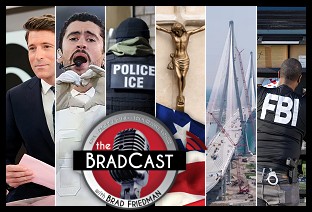 Trump's Presidency Now About Little More Than Racism, Corruption, Culture War Nonsense: 'BradCast' 2/10/26
Trump's Presidency Now About Little More Than Racism, Corruption, Culture War Nonsense: 'BradCast' 2/10/26 'Green News Report' 2/10/26
'Green News Report' 2/10/26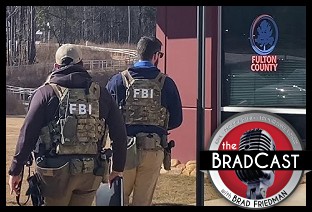 About Trump's FBI Raid of the Fulton County, GA Elections Warehouse: 'BradCast' 2/9/26
About Trump's FBI Raid of the Fulton County, GA Elections Warehouse: 'BradCast' 2/9/26 Sunday 'Dead in Darkness' Toons
Sunday 'Dead in Darkness' Toons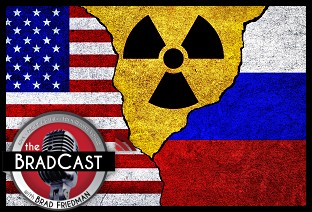 'New START' Treaty Allowed to End Amid New World Disorder: 'BradCast' 2/5/26
'New START' Treaty Allowed to End Amid New World Disorder: 'BradCast' 2/5/26 'Green News Report' 2/5/26
'Green News Report' 2/5/26 Trump Turns 'War on Terror' Tools Against Domestic Political Foes: 'BradCast' 2/4/26
Trump Turns 'War on Terror' Tools Against Domestic Political Foes: 'BradCast' 2/4/26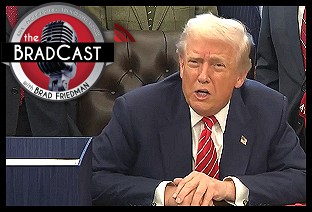 Losing Legally and Politically, Trump Threatens to 'Nationalize' Elections: 'BradCast' 2/3/26
Losing Legally and Politically, Trump Threatens to 'Nationalize' Elections: 'BradCast' 2/3/26 'Green News Report' 2/3/26
'Green News Report' 2/3/26 Bad and Good Bunnies, and an Electoral Shock in Deep 'Red' TX: 'BradCast' 2/2/26
Bad and Good Bunnies, and an Electoral Shock in Deep 'Red' TX: 'BradCast' 2/2/26 Sunday 'Mirror, Mirror' Toons
Sunday 'Mirror, Mirror' Toons 'Green News Report' 1/29/26
'Green News Report' 1/29/26 It's About Elections and the Windmills of His Mind: 'BradCast' 1/29/26
It's About Elections and the Windmills of His Mind: 'BradCast' 1/29/26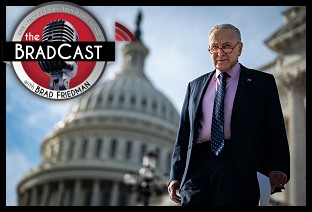 Govt Shutdown Over ICE Funding Near Certain This Weekend: 'BradCast' 1/28/26
Govt Shutdown Over ICE Funding Near Certain This Weekend: 'BradCast' 1/28/26 Trump Blinks, Bovino Out, MN Op Falters, Persists as Midterms Loom: 'BradCast' 1/27
Trump Blinks, Bovino Out, MN Op Falters, Persists as Midterms Loom: 'BradCast' 1/27  The ICE Murder of ICU Nurse Alex Pretti and the Heroes of Mpls: 'BradCast' 1/26/26
The ICE Murder of ICU Nurse Alex Pretti and the Heroes of Mpls: 'BradCast' 1/26/26  The BRAD BLOG: 22 Years and Still Counting
The BRAD BLOG: 22 Years and Still Counting Mr. Smith Testifies (Publicly) in Washington: 'BradCast' 1/22/26
Mr. Smith Testifies (Publicly) in Washington: 'BradCast' 1/22/26 World Turning Against Self-Destructing U.S. Under Trump: 'BradCast' 1/21/26
World Turning Against Self-Destructing U.S. Under Trump: 'BradCast' 1/21/26 Trump Waste, Fraud, Abuse on Voting, at DOJ, by DOGE: 'BradCast' 1/20/26
Trump Waste, Fraud, Abuse on Voting, at DOJ, by DOGE: 'BradCast' 1/20/26
 VA GOP VOTER REG FRAUDSTER OFF HOOK
VA GOP VOTER REG FRAUDSTER OFF HOOK Criminal GOP Voter Registration Fraud Probe Expanding in VA
Criminal GOP Voter Registration Fraud Probe Expanding in VA DOJ PROBE SOUGHT AFTER VA ARREST
DOJ PROBE SOUGHT AFTER VA ARREST Arrest in VA: GOP Voter Reg Scandal Widens
Arrest in VA: GOP Voter Reg Scandal Widens ALL TOGETHER: ROVE, SPROUL, KOCHS, RNC
ALL TOGETHER: ROVE, SPROUL, KOCHS, RNC LATimes: RNC's 'Fired' Sproul Working for Repubs in 'as Many as 30 States'
LATimes: RNC's 'Fired' Sproul Working for Repubs in 'as Many as 30 States' 'Fired' Sproul Group 'Cloned', Still Working for Republicans in At Least 10 States
'Fired' Sproul Group 'Cloned', Still Working for Republicans in At Least 10 States FINALLY: FOX ON GOP REG FRAUD SCANDAL
FINALLY: FOX ON GOP REG FRAUD SCANDAL COLORADO FOLLOWS FLORIDA WITH GOP CRIMINAL INVESTIGATION
COLORADO FOLLOWS FLORIDA WITH GOP CRIMINAL INVESTIGATION CRIMINAL PROBE LAUNCHED INTO GOP VOTER REGISTRATION FRAUD SCANDAL IN FL
CRIMINAL PROBE LAUNCHED INTO GOP VOTER REGISTRATION FRAUD SCANDAL IN FL Brad Breaks PA Photo ID & GOP Registration Fraud Scandal News on Hartmann TV
Brad Breaks PA Photo ID & GOP Registration Fraud Scandal News on Hartmann TV  CAUGHT ON TAPE: COORDINATED NATIONWIDE GOP VOTER REG SCAM
CAUGHT ON TAPE: COORDINATED NATIONWIDE GOP VOTER REG SCAM CRIMINAL ELECTION FRAUD COMPLAINT FILED AGAINST GOP 'FRAUD' FIRM
CRIMINAL ELECTION FRAUD COMPLAINT FILED AGAINST GOP 'FRAUD' FIRM RICK SCOTT GETS ROLLED IN GOP REGISTRATION FRAUD SCANDAL
RICK SCOTT GETS ROLLED IN GOP REGISTRATION FRAUD SCANDAL VIDEO: Brad Breaks GOP Reg Fraud Scandal on Hartmann TV
VIDEO: Brad Breaks GOP Reg Fraud Scandal on Hartmann TV RNC FIRES NATIONAL VOTER REGISTRATION FIRM FOR FRAUD
RNC FIRES NATIONAL VOTER REGISTRATION FIRM FOR FRAUD EXCLUSIVE: Intvw w/ FL Official Who First Discovered GOP Reg Fraud
EXCLUSIVE: Intvw w/ FL Official Who First Discovered GOP Reg Fraud GOP REGISTRATION FRAUD FOUND IN FL
GOP REGISTRATION FRAUD FOUND IN FL

































